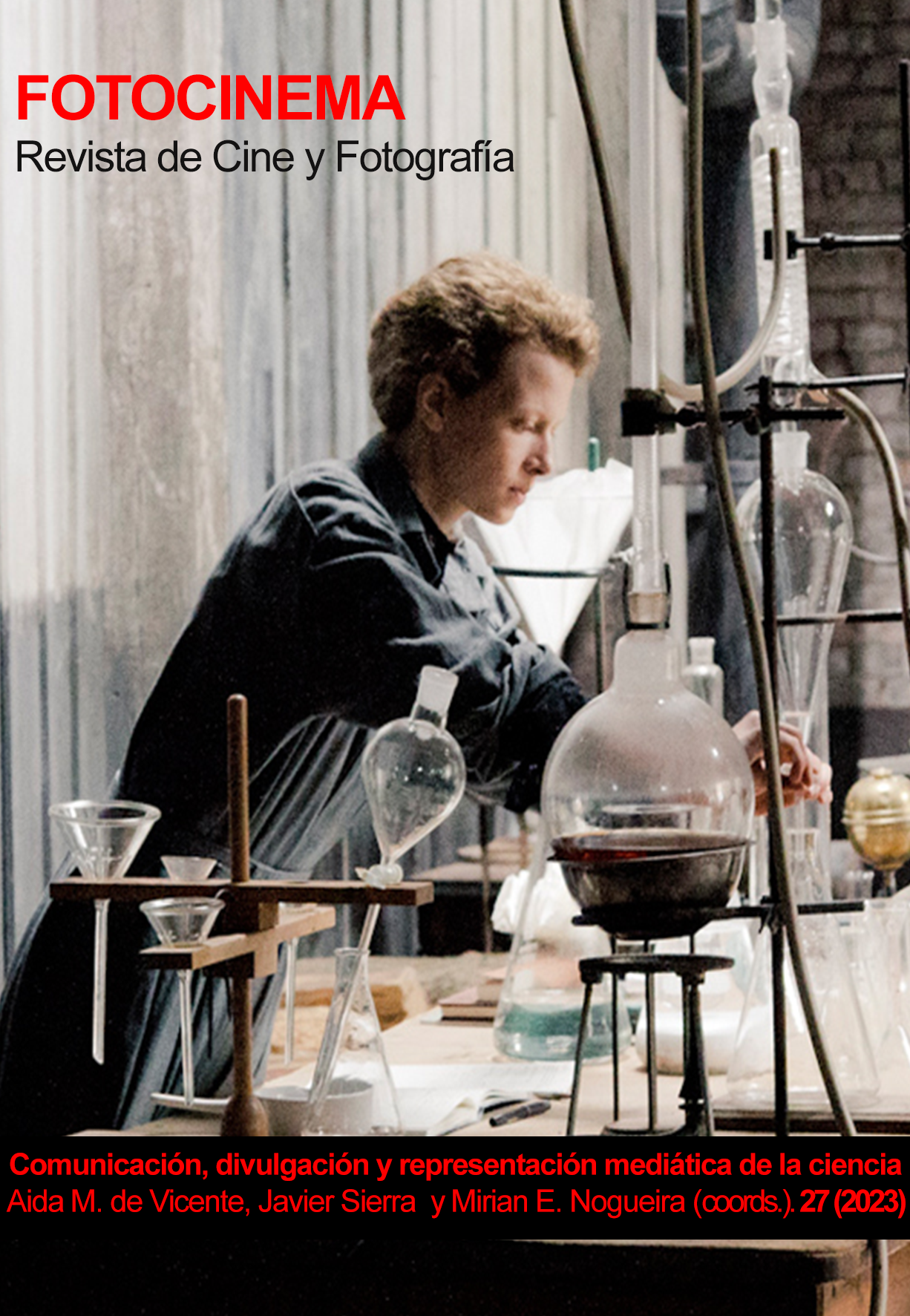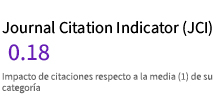Marie Curie's audiovisual fiction: beyond the scientific divulgation
DOI:
https://doi.org/10.24310/Fotocinema.2023.vi27.16536Keywords:
Marie Curie, Movies, Series, Fiction, Documentaries, DivulgationAbstract
Marie Curie is one of the most relevant figures not only in the scientific field, but also historically for many different reasons. This has led cinema and television for decades to portray her life focusing on one or other aspects. This research analyzes twelve audiovisual productions in which fiction is used to a greater or lesser extent to recreate the trajectory of this scientist, divided into four themes: childhood, scientific work, marriage and personal life (Langevin, nurse and daughters). The study of these fields within each of the films, series and documentaries that make up the exhibition reveals interesting divergences between the person and the character of Marie Curie. At the same time, different approaches are observed according to the target audience and the context in which these productions were made. It can be concluded that the figure of Curie and her heterogeneous edges have been well exploited by most of the analyzed filmography to go beyond the dissemination of her scientific work and portray her, in many cases, as someone ahead of her time and even advanced for the present day.
Downloads
Metrics
Publication Facts
Reviewer profiles N/A
Author statements
Indexed in
-
—
- Academic society
- N/A
- Publisher
- Universidad de Málaga
References
Adúriz Bravo, A. (2014). La historia de la ciencia en la enseñanza de la naturaleza de la ciencia: Maria Sk?odowska-Curie y la radiactividad. Educació Química, 16, 10-16. https://ri.conicet.gov.ar/handle/11336/822
Alarcón, N. (2018). La enseñanza de la epistemología y estrategias de abordaje para el aula. Historia Regional, (38), 1-10. http://rephip.unr.edu.ar/handle/2133/18153
Amenábar, A. (Director). (2009). Ágora [Película]. Telecinco Cinema, Mod Producciones, Himenóptero.
Amiel, J. (Director). (2009). Creation [La duda de Darwin] [Película]. Recorded Picture Company (RPC), UK Film Council, Newmarket.
Apted, M. (Director). (1988). Gorillas in the mist [Gorilas en la niebla] [Película]. Universal Pictures, Warner Bros.
Baños, J. E., y Bosch, F. (2015). Using feature films as a teaching tool in medical schools. Educación médica, 16(4), 206-211. https://doi.org/10.1016/j.edumed.2015.09.001
Barillé, A. (Director). (1 de marzo de 19945). Marie Curie (Episodio 22). En Barillé, A. (1994-1995). Il était une fois... les Découvreurs [Érase una vez… los inventores] [Serie de Televisión]. (1994-1995). Procidis.
Bercot, E. (Director). (2016). La fille de Brest [La doctora de Brest] [Película]. Haut et Court, France 2 Cinema, Cofinova, Soficinema 12, SofiTVCiné 3, Palatine Étoile 13, Cinémage 10, Canal+, Ciné+, France Télévisions.
Boisrond, M. (Director). (1991). Marie Curie, une femme honorable [Marie Curie, una mujer honorable] [Película]. Antea Cinematografica, Cinecittà, Figaro Films, Mars International Productions, Poltel Films.
Brunard, A. (Director). (2014). Marie Curie, une femme sur le front [Marie Curie, una mujer en el frente] [Película]. Capa Drama, BE-FILMS, RTBF (Télévision Belge), uFilms, Planète +, RTBF (Télévision Belge), GA&A Productions, Ministère de la Défense, Centre du Cinéma et de l'Audiovisuel.
Buelvas Baldiris, T., y Rubira García, R. (2023). Female Leadership Portraits in Commercial Movies: Gender Social Representations from the STEAM Sector. Visual Review. International Visual Culture Review / Revista Internacional De Cultura Visual, 15(4), 1–15. https://doi.org/10.37467/revvisual.v15.4960
Campbell, J. (1959). The Hero with a Thousand Faces. Pantheon Books.
Carvalho, F. P. (2012). Marie Curie and the discovery of radium. En B. Merkel y M. Schipek (Eds.), The New Uranium Mining Boom: Challenge and Lessons learned (pp. 3-13). Springer. https://link.springer.com/chapter/10.1007/978-3-642-22122-4_1
Casetti, F., y Di Chio F. (2014). Cómo analizar un film. Paidós.
Cavani, L. (Director). (1968). Galileo [Película]. Fenice Cinematografica, Rizzoli Film, Kinozenter.
Chung, K. T. (2009). Madame Marie Sklodowska Curie. En Women Pioneers of Medical. Research: Biographies of 25 Outstanding Scientists (pp. 52-67). McFarland & Co.
Coursey, B. M. (2017). A reflection on the 150 anniversary of the birth of Marie Curie. Applied Radiation and Isotopes, 130, 280-284. https://doi.org/10.1016/j.apradiso.2017.10.028
Cregan, E. R. (2008). Marie Curie: Pioneering Physicist. Capstone.
Dobrzynska, M. M. (2017). Maria Sklodowska-Curie, her life and work-the 150 anniversary of her birthday. Roczniki Pa?stwowego Zak?adu Higieny, 68(3). https://bibliotekanauki.pl/articles/875470.pdf
Estrada-Lorenzo, J. M. (2023). Los biopics de científicos: un acercamiento desde el cine a la historia de la ciencia. Documentación de las Ciencias de la Información, 46(1), 13-23. https://dx.doi.org/10.5209/dcin.83751
Evans, J. (2013). At the borders between translation and parody: Lydia Davis’s story about Marie Curie. TTR, 25(2), 167-191. https://www.erudit.org/en/journals/ttr/1900-v1-n1-ttr0844/1018807ar/abstract/
Ferry, G. (2020). Marie Curie biopic should have trusted pioneer's passion. Nature, 579(7797), 490-491. https://www.nature.com/articles/d41586-020-00737-7
Flicker, E. (2003). Between brains and breasts – Women scientists in fiction film: On the marginalization and sexualization of scientific competence. Public Understanding of Science, 12(3), 307-318. https://doi.org/10.1177/0963662503123009
Franju, G. (Director). (1953). Monsieur et Madame Curie [Película]. Armor Films, Téléfilms.
Frankenheimer, J. (Director). (1962). Birdman of Alcatraz [El hombre de Alcatraz] [Película]. United Artists.
Gallego Cruz, C. (2021). Mujeres con ciencia. Making of: cuadernos de cine y educación, (163), 1-16. https://cartografias.net/wp-content/uploads/2022/09/Mujeres-con-ciencia-CARMEN-GALLEGO-CRUZ.pdf
Garey, E. (2022). Marie Curie: A Lesson in Lapsed Time and Restaged Stories. The Mall, 6(1), 27-32. https://digitalcommons.butler.edu/cgi/viewcontent.cgi?article=1502&context=the-mall
Gasi?ska, A. (1999). Life and Work of Marie Sklodowska-Curie and her Family. Acta Oncologica, 38(7), 823-828, https://doi.org/10.1080/028418699432509
Glenister, J. (Director). (1977). Marie Curie [Película]. BBC, Polytel, Time-Life Television Productions.
Gonçalves-Maia, R. (2012). Marie Sk?odowska Curie–Imagens De Outra Face. Edições Colibri.
Henriques, F. (2017). Nem justa, nem injusta: Discriminadora. As Mulheres e a guerra. Medi@ ções, 5(1), 93-115. http://mediacoes.ese.ips.pt
Howard, R. (Director). (2001). A beautiful mind [Una mente maravillosa] [Película]. DreamWorks SKG, Universal Pictures, Imagine Entertainment
Howes, R. (2017). Marie Curie: Physicist and Woman. APS March Meeting Abstracts, 40(3). https://ui.adsabs.harvard.edu/abs/2017APS..MARV40003H/abstract
Ince, K. (2019). Georges Franju. Manchester University Press.
Ivanov, A. (Director). (1955). Mikhaylo Lomonosov (??????? ?????????) [Película]. Leninfilm Studio.
Jackson, M. (Director). (2010). Temple Grandin [Película]. HBO, Ruby Films.
Jiménez Sánchez, Á., Lavín, J. M., y Martín García, N. (2023). El videojuego como motor de la trama fílmica: una intertextualidad en auge. Convergencia Revista de Ciencias Sociales, 30, 1-24. https://doi.org/10.29101/crcs.v30i0.20385
Jukes, E. (2012). A Biographical Encyclopedia of Scientists and Inventors in American Film and TV Since 1930. Reference Reviews, 26(6), 49-50. https://doi.org/10.1108/09504121211251916
Lavín, J. M., y Jiménez Sánchez, Á. (2019). Saga libertadores: independencia iberoamericana en el cine. Fonseca, Journal of Communication, (18), 167–184. https://doi.org/10.14201/fjc201918167184
Le Guludec, D., the History Corner. (2023). Marie Curie, PhD (1867–1934). J. Nucl. Cardiol., 30, 17–19. https://doi.org/10.1007/s12350-022-03101-6
LeRoy, M. (Director). (1943). Madame Curie [Película]. Metro-Goldwyn-Mayer (MGM).
Leszczy?ska, K. (2011). Maria Sk?odowska-Curie–Woman, Wife and Mother. Polish Political Science Yearbook, 40, 314-329. https://cejsh.icm.edu.pl/cejsh/element/bwmeta1.element.ojs-doi-10_15804_ppsy2011017
Londero, L., y Pavan Sorpreso, T. (2017). A natureza das ciências na formação de professores de física por meio do drama biográfico. “Marie Curie, une femme sur le front”. Enseñanza de las ciencias, (Extra), 3741-3746. https://ddd.uab.cat/record/183838
Losey, J. (Director). (1975). Galileo [La vida de Galileo] [Película]. The American Film Theatre y The Ely Landau Organization Inc.
Man, K., Sabourin, V. M., Gandhi, C. D., Carmel, P. W., y Prestigiacomo, C. J. (2015). Pierre Curie: the anonymous neurosurgical contributor. Neurosurgical Focus FOC, 39(1), E7. https://doi.org/10.3171/2015.4.FOCUS15102
Marsh, J. (Director). (2014). The Theory of everything [La Teoría del Todo] [Película]. Working Title Films.
Mejón, A., y Jiménez Alcarria, F. (2022). Mujeres científicas en el cine. El caso de Hipatia de Alejandría en Ágora (Alejandro Amenábar, 2009). Área Abierta, 22(2), 237-254. https://doi.org/10.5209/arab.79635
Melfi, T. (Director). (2016). Hidden Figures [Figuras ocultas] [Película]. Levantine Films, Chernin Entertainment, Fox 2000 Pictures.
Mozer, R. (Director). (1997). Marie Curie: More tan meets the eye [Película]. Devine Entertainment.
Muñoz Páez, A. (2013). Marie Sklodowska-curie and radioactivity. Educación química, 24(2), 224-228. https://www.scielo.org.mx/scielo.php?pid=S0187-893X2013000200007&script=sci_abstract&tlng=en
Noëlle, M. (Director). (2016). Marie Curie [Película]. P'Artisan Filmproduktion, Pokromski Studio, Glory Film, Climax Films, Schubert Music Publishing.
Notargiacomo Mustaro, P., et al. (2013). Análise fílmica sobre a representação de jogos electrônicos no cinema: um estudio a partir de narratología e mitología. XII SBGames. São Paulo, SP, Brazil. http://www.sbgames.org/sbgames2013/proceedings/cultura/Culture-11_full.pdf
Olszewski, E. (2011). Maria Sklodowska-Curie-A Sketch to the Portrait. Polish Pol. Sci. YB, 40, 287. https://heinonline.org/HOL/LandingPage?handle=hein.journals/ppsy36&div=19&id=&page=
Parkyn, M. (2015). Struggle and Emerge: An Analysis of the Biopic, Documentary, and Drama Film Genres. Mount Royal Undergraduate Humanities Review (MRUHR), 3. https://doi.org/10.29173/mruhr227
Petelska, E. y Petelski, C. (Directores). (1973). Kopernik [Nicolás Copérnico] [Película]. Deutsche Film (DEFA), ZRF "Iluzjon". Distribuidora: VEB Progress Film-Vertrieb.
Pinoteau, C. (Director). (1997). Les Palmes de Monsieur Schutz [Los méritos de Madame Curie] [Película]. France 2 Cinema, French Productions, L Films, Canal+, Sofineurope.
Quinn, S. (2019). Marie Curie: A Life. Plunkett Lake Press.
Rich, R., y Brown, J. (Directores). (1 de junio de 1997). Marie Curie (Temporada 2, Episodio 19). En Rich, R. y Brown, J. Gilligan. (1991-2004)., Animated Hero Classic [Enciclopedia animada de personalidades históricas] [Serie de Televisión]. (1991-2004). Nest entertainment y Warner-Nest Animation.
Rogulski, K. (Director). (2011). Women Who Changed the World - In the footsteps of Marie Curie [Tras los pasos de Marie Curie] [Película]. Alchimic films – Filmstom Productions, TV5 Monde y Culturel and Artistic Center of Mazovie.
Satrapi, M. (Director). (2019). Madame Curie (Radioactive) [Película]. Working Title Films, Studio Canal, Shoebox Films, Pioneer Stilking Films. Distribuidora: Amazon Studios.
Sedeño Valdellós, A. M. (2022). La mujer científica en el cine: representación y formas del imaginario cinematográfico. Opción: Revista de Ciencias Humanas y Sociales, (29), 38-63. https://dialnet.unirioja.es/servlet/articulo?codigo=8697024
Sheean, V. (2013). Madame Curie-A Biography by Eve Curie. Read Books Ltd.
Spalluto, L. B. (2017). Marie Curie–stirring the pot. Clinical Imaging, 46. https://doi.org/10.1016/j.clinimag.2017.09.009
Steinhoff, H. (Director). (1939). Robert Koch, der Bekämpfer des Todes [Roberto Koch, el vencedor de la muerte] [Película]. Tobis Filmkunst.
Strathern, P. (2015). Curie y la radiactividad. Siglo XXI de España Editores.
Sulbarán Piñeiro, E. (2000). El análisis del film: entre la semiótica del relato y la narrativa fílmica. Opción: Revista de Ciencias Humanas y Sociales, 16(31). https://dialnet.unirioja.es/servlet/articulo?codigo=2474953
Taurog, N. (Director). (1940). The young EdisonYoung Tom Edison [El joven Edison] [Película]. Metro-Goldwyn-Mayer (MGM).
Terrone, E. (2020). Documentaries, docudramas, and perceptual beliefs. The Journal of Aesthetics and Art Criticism, 78(1), 43-56. https://doi.org/10.1111/jaac.12703
Thurston, B. J. (1999). Marie Sklodowska Curie. En Mark A. Runco y Steven R. Pritzker (Eds.), Encyclopedia of Creativity (pp. 465-468). Academic Press.
Torres, L. E. (2014). Review of The Madame Curie Complex: The Hidden History of Women in Science, by J. Des Jardins. Feminist Formations, 26(1), 187–191. http://www.jstor.org/stable/43860736
Trombetta, M. (2014). Madame Maria Sklodowska-Curie–brilliant scientist, humanitarian, humble hero: Poland’s gift to the World. Journal of Contemporary Brachytherapy, 6(3), 297-299. https://doi.org/10.5114/jcb.2014.45133
Tyldum, M. (Director). (2014). The Imitation game [Descifrando Enigma] [Película]. Black Bear Pictures, Ampersand Pictures.
Waxman, L. H. (2003). Marie Curie. Lerner Publications.
Y?ld?r?m, B., Öcal, E., y ?ahin Topalcengiz, E. (2021). Stem in movies: Female preservice teachers’ perspectives on movie “hidden figures”. Journal of Baltic Science Education, 20(5), 740-758, https://doi.org/10.33225/jbse/21.20.740.
Downloads
Published
How to Cite
Issue
Section
License
All contents published in Fotocinema Revista científica de cine y fotografía are protected under the Creative Commons Attribution-NonCommercial-ShareAlike 4.0 International (CC BY-NC-SA 4.0) license. All about this license is available in the following link: <http://creativecommons.org/licenses/by-nc-sa/4.0>
Users can copy, use, redistribute, share and exhibit publicly as long as:
- The original source and authorship of the material are cited (Journal, Publisher and URL of the work).
- It is not used for comercial purposes.
- The existence of the license and its especifications are mentioned.
There are two sets of authors’ rights: moral and property rights. Moral rights are perpetual prerogatives, unrenounceable, not-transferable, unalienable, imprescriptible and inembargable. According to authors’ rights legislation, Fotocinema. Revista científica de cine y fotografía recognizes and respects authors moral rights, as well as the ownership of property rights, which will be transferred to University of Malaga in open access. The property rights are referred to the benefits that are gained by the use or the dissemination of works. Fotocinema. Revista científica de cine y fotografía is published in an open access form and it is exclusively licenced by any means for doing or authorising distribution, dissemination, reproduction, , adaptation, translation or arrangement of works.
Authors are responsable for obtaining the necessary permission to use copyrighted images.














13.png)



